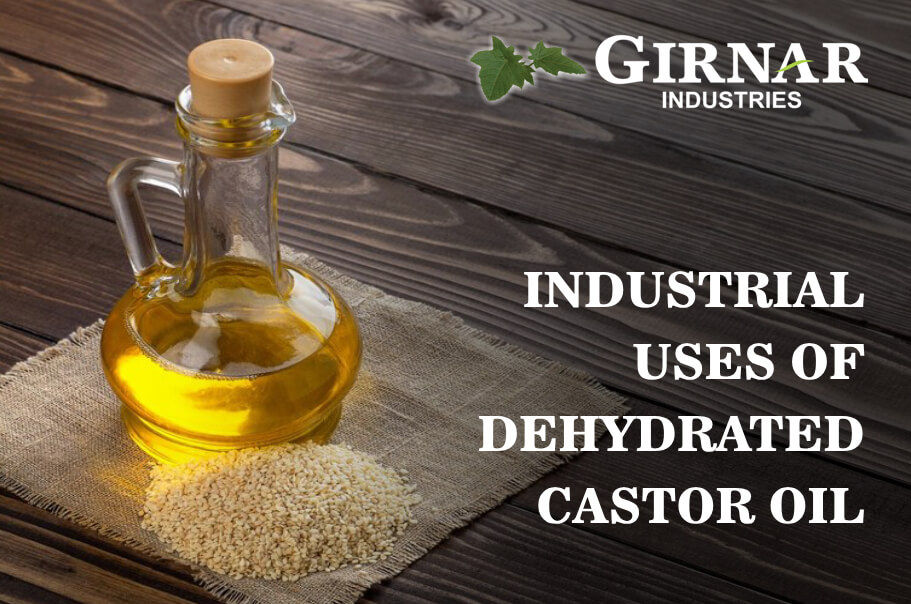Dehydrated Castor Oil is an important element in industrial chemistry because it is flexible and has multiple uses including paints, varnishes, enamel coatings, corrosion-resistant coatings, maritime paints, and wire enamels.
What is Dehydrated Castor Oil?
Dehydrated castor oil is prepared by heating castor oil to eliminate its water content. This produces a durable and stable product with enhanced qualities suitable for a variety of industrial applications.
Production Process
To produce this castor oil, manufacturers slowly heat castor oil to high temperatures, typically around 250 °C, under vacuum conditions. This method effectively eliminates water and chemical impurities, leaving behind a dense and permanent residue. The resulting liquid is clear and viscous, maintaining the therapeutic features of castor oil while improving stability and performance.
Benefits in Paints
Paint formulations commonly use this castor oil to boost adhesion and durability. It works as a binder, enhancing the cohesion of paint layers and thereby improving their resistance to weathering and abrasion. Its excellent suitability for exterior coatings comes from its ability to withstand tough environmental conditions.
Benefits in Varnishes
This castor oil is an important ingredient in varnishes that improves gloss and provides a smooth finish. Its film-forming qualities serve as a protective layer over surfaces, making them more resistant to scratches and stains. This is especially useful in furniture varnishes, where beauty and durability are important.
Benefits in Enamel Coatings
This castor oil improves flow and leveling, which benefits enamel coatings greatly. It provides uniform coverage while reducing brush marks and roller streaks, resulting in a perfect surface finish. Also, it improves the overall endurance of enamel coatings, making them suitable for high-traffic environments.
Benefits in Corrosion-Resistant Coatings
Corrosion-resistant coatings also utilize this castor oil for its chemical stability and moisture resistance, protecting metal surfaces from rust and corrosion. Automobile parts, industrial gear, and infrastructure in hostile environments often feature these coatings.
Benefits in Marine Paints
Marine paints must be highly durable and resistant to saltiness, UV radiation, and abrasion. By generating a strong barrier that protects ship hulls and maritime structures from corrosion and biofouling, dehydrated castor oil contributes to these qualities. It provides long-term protection in marine conditions, increasing maintenance intervals and lowering overall expenses.
Benefits in Wire Enamels
Dehydrated castor oil, as an important component in wire enamel production, enhances the coating’s adhesion to metal wires. It increases electrical insulating qualities and mechanical strength, resulting in solid performance in electrical applications such as transformers, motors, and cables.
Conclusion
In conclusion, dehydrated castor oil is a flexible component with a wide range of industrial applications. Its unique features improve the performance, durability, and visual appeal of paints, varnishes, enamel coatings, corrosion-resistant coatings, maritime paints, and wire enamels. As industries seek sustainable and effective solutions, dehydrated castor oil remains a top choice for improving product formulations and satisfying a wide range of application requirements.
FAQ’S:
What are the health and safety considerations when handling Dehydrated Castor Oil?
When working with Dehydrated Castor Oil, wear safety glasses or goggles to protect your eyes and rubber gloves to keep your skin safe. Make sure you work in a well-ventilated place to avoid breathing vapors or dust.
What are the differences between Dehydrated Castor Oil and other types of castor oil derivatives?
Dehydrated castor oil has a lower hydroxyl value than castor oil because during dehydration, the hydroxy group-containing ricinoleic acid turns into 9,11 and 9,12 linoleic acids. Castor oil has a higher flash point.
Does castor oil need to be stored in a dark container?
Yes, castor oil should be stored in a cold, dark place to maintain its quality and purity.
How does Dehydrated Castor Oil contribute to the adhesion properties of coatings?
Dehydrated Castor Oil improves coating adhesion by generating a long-lasting film that adheres effectively to surfaces, boosting cohesion and resistance to environmental conditions, making it perfect for industrial and specialized coatings.
What are the storage and shelf-life considerations for Dehydrated Castor Oil?
To avoid oxidation, dehydrated castor oil should be kept in a cool, dry location out of the sun. When stored properly, its shelf life usually lasts between one and two years.


